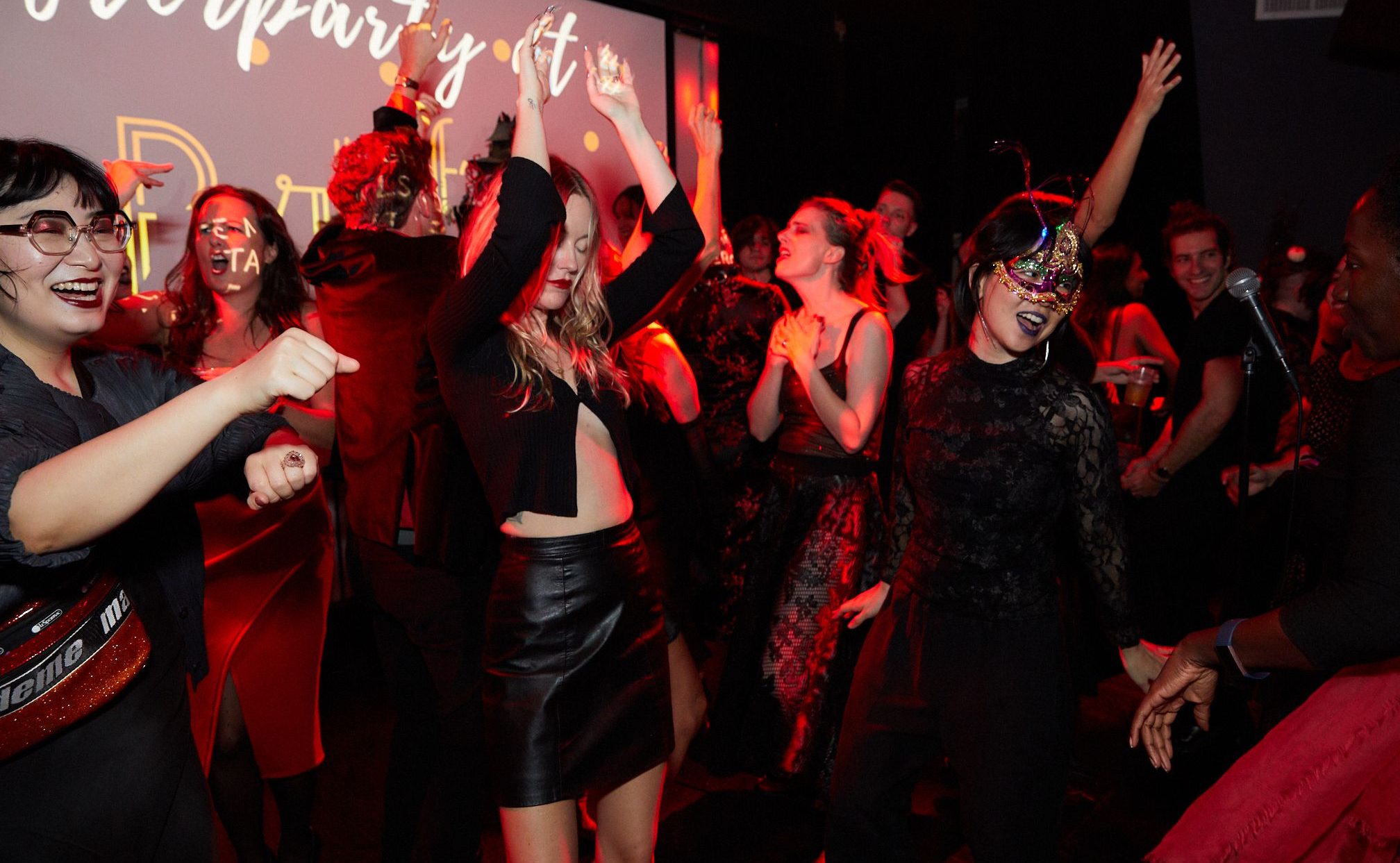essays
“People Unlike Airplanes” by Jim Hanas

“This, or this?” the young woman asked, tapping her nails on two photographs arrayed on the fold-out tray between herself and the subject — a man who had been complaining since at least Kansas City that the blood-pressure cuff was irritating his eczema. He rolled his head and looked out the window, down on what must have been Denver.
“This,” he said, indicating one of the pictures with a nod.
“I’ll need a hand signal,” she said. “For the cameras.”
The man tapped an electrode-wrapped forefinger on one of the photos. The woman propped her glasses on her nose and recorded his response before arranging two more photographs on the tray.
“This, or this?” she repeated, tapping her nails to draw the man’s attention back from what must have been Boulder. The man was tired of answering questions and was glad it wouldn’t be much longer before they landed. The knot of his tie had slid to half-mast and moist stains bloomed where his arms met his torso. He wanted to change his shirt. How much longer, exactly, would it be?
“I’ll ask the questions,” the woman said, again tapping her nails on the tray.
The young woman’s lab coat was sexy, the man thought without considering the pictures. The hum of the engines was sexy and the woman’s incessantly tapping nails — these were sexy, too. He considered her knees, which were the color of carrot cake, as they appeared between her blue lab coat and her tall, tight boots, and he contemplated having sex with her — right then and there — in the aisle of the modified Airbus 320 in which he now found himself more or less imprisoned.
“It’s time for your taste test,” said another woman who appeared at his side with a serving cart. She placed two tiny paper cups of fizzy, brown liquid on the fold-out tray. Bill Hammerling took a sip from each cup before the woman opposite him tapped their rims with her nails.
“This, or this?”
He smiled but the young woman did not smile back.
Simmons had been in rooms like this before. Lots of times. As a teenager, he had groped at the breasts and buttoned flies of girls named Kat, and Kate, and Katie, and Katherine in rooms more or less exactly like this one. Such rooms — right inside the front door, just off the foyer — were never used, in his experience, except for such hapless late-night purposes. Children were forbidden from entering rooms like these, he remembered, and growing up he had witnessed many homes engulfed in jubilant chaos — littered with board games, piles of laundry, and slot-racing tracks — that somehow stopped at the threshold of this room. Looking through the doorway, then like now, was like staring into the soothing waters of an aquarium.
He had been shown in by a boy on the front lawn who was busy driving a softball deep into the freshly laid sod with a lacrosse stick. He was probably thirteen. His blonde hair was tangled and he smelled like stale hockey equipment. He grudgingly stomped up the stairs to get his stepmother, while Simmons braced for her arrival.
He had never met Bill Hammerling’s wife before, not this one, and he had not seen Bill himself in ten years, although his name had still jumped off the page. Bill had done well. The faux Queen Anne in which Simmons now stood was among the first to be completed in the surrounding development, and the home — elevated on a slight hillock — was plainly visible from the Tudor model home that marked the entrance to the neighborhood. Simmons had weaved his way toward it carefully, slaloming through the wooden stakes that marked the future placement of streets and driveways. The streets were not yet marked, but Bill’s circular driveway was clearly labeled — with both name and address — on a mailbox poised atop a length of anchor chain welded to maintain the posture of an angry cobra.
Kitty Hammerling was girlish, Simmons noted as she appeared at the top of the steps.
“Can I help you?” she asked.
Her blonde hair was pulled into a ponytail high on the back of her head, and she might have been mistaken for a college student — in her khaki Capri’s and oversized T-shirt tied to the side — if not for an enormous trio of diamonds that hung from her wedding ring.
Simmons’ paramilitary appearance no doubt took her by surprise. The company’s founders were Navy men, and they had imparted to FreeBird Airlines a martial structure. Everyone wore uniforms, although the one Simmons wore was barely distinguishable from those worn by pharmacists or busboys. It consisted of a crisp white shirt with basic cotton epaulets and an embossed crest positioned above his heart. The second Mrs. Hammerling (or was she the third?) might have easily mistaken him for the exterminator.
“There’s been an accident,” Simmons said. He held out an arm to suggest they might talk more comfortably in the forbidden room, the room that he had understood since childhood was for important matters only — the appearance of clergy, funerals and christenings, and matters like this.
Kitty Hammerling turned ashen as she understood that this was no good. She perched on the edge of the white couch while Simmons took one of the stiff chairs, his aluminum briefcase sandwiched between his ankles.
“Bill’s plane has gone down,” he said.
Kitty Hammerling started to cry.
Simmons didn’t know what to do. He had thought about it for the entire drive and had still failed to come up with an answer. He leaned forward and rested his elbows on his knees, like he might reach out and touch her if it became necessary, although he didn’t know when, exactly, that would be. He wondered what FreeBird’s legal department would recommend.
She covered her face and he could see that her fingers were unusually long and that the thin bones in the backs of her hands pulsed under her soft, tanned skin like gently throbbing veins. She had dark, fine hair on her forearms, he could now see, and also on her cheeks.
She got up and left the room. Simmons remained seated and wondered if he should leave. Maybe that’s what she expected — for him to leave. He closed his eyes and tried to remember the opening line of the prayer for the Can having gone down but could only remember the last: “People, unlike airplanes, look larger from farther away,” the unofficial motto of FreeBird Airlines.
Like most mottos, it meant different things to different people. To FreeBird’s clients, it meant that consumers’ cherished preferences might seem inscrutable from a distance, but never fear, they could be made clear by well-conceived batteries of tests administered to captive audiences of air travelers who agreed to submit to such scrutiny in exchange for free flights to demographically rich destinations like Indianapolis, Chicago, and (until this morning) Los Angeles. To FreeBird’s army of commission-starved account executives, it meant that a client might seem unapproachable — unsellable — from a distance, but close up, each was as vulnerable as the next to FreeBird’s ingenious sales pitch. And to FreeBird’s passengers? Great care was taken to ensure that FreeBird’s passengers never heard the unofficial motto.
Kitty Hammerling returned, clutching a wad of tissues.
“I brought Bill’s file,” Simmons offered as he eased it out of his briefcase. It was in a worn interoffice folder, its crimson string wound tightly around the two-ply fastening-disk. It had been carefully edited to preserve Bill’s preferences for salmon (the color) and Magneto (the font), and to redact his fascination with the tanning cream and tall black boots that had been indirectly tested (ambiently, as they say) on his ill-fated flight. (“Leering” was the word that appeared again and again in the qualitatives.)
“That’s nice,” his wife managed, although Simmons could tell it provided little comfort. While people often put great stock in their loved ones’ files, there was still this sting.
“Did you know him?” she asked quietly.
“We were in the Navy.”
“In the gulf?”
“And the straits, too. Persian. Tonkin. Gibraltar. Hormuz.”
“You were close?” she asked.
“As close as you can be and not talk in ten years,” Simmons said.
She smiled weakly.
“That’s his son?” Simmons asked.
She nodded, grinding back more tears. It was clear that the boy’s only link to his stepmother was through his father and without him, they might not get along so well.
Mrs. Hammerling suddenly wilted, like she was about to faint, and Simmons forgot all about FreeBird’s lawyers as he leaned forward and grabbed her elbows, hoping to steady her, as the front door slammed and the scent of hockey equipment leaked into the clean white room.
“You’ve got to help me tell him,” she whispered, and Simmons realized that the boy — slouching into view now, smirking — was at once the largest and smallest creature in the known universe. Smaller than the whale, smaller than the elephant, yet still larger than the lowly airplane.
–Jim Hanas is the author of the short story collection Why They Cried — forthcoming this month as a Joyland eBook from ECW Press — from which this excerpt was taken. He reads tonight at McNally Jackson Books in Manhattan with Joyland co-founder Emily Schultz, Zoe Whithall, and Amanda Stern.
Photo courtesy of http://www.aviationspectator.com/









